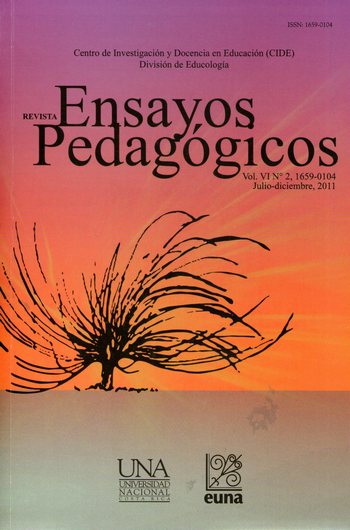The Protocurricular Strengthening of the Tutoring Component of a Spanish as a Foreign Language Program: Approaching the Virtualization of the Process
DOI:
https://doi.org/10.15359/rep.6-2.10Keywords:
programs of Spanish as a Foreign Language, linguistic diagnosis, virtual tutorshipAbstract
This document describes three different types of academic tutoring recommended to accompany the curriculum of programs of Spanish as a Foreign Language in order to highlight their contribution to the teaching-learning process of students who travel to another country to learn Spanish in situ. Emphasis is placed on in corporating technology as an integral part of the activities of the tutors in their work sessions, while rescuing the linguistic importance of diagnosis as the first step to the design of a customized curriculum content. The paper also introduces how to develop a virtual mentoring platform with in the
university, drawing on the experience of the authors, as coordinators of programs of Spanish as a Foreign Language at Universidad Nacional, Costa Rica
References
CorredorMontagut, M. etal. (2008). Módulos con extensiones multimedia para apoyar la educación a distancia. Buenos Aires: Escuela Nacional de Salud Pública. En línea.
Cruz-Piñol, M.(2008). Presencia (y ausencia) de los hipermedios y de los géneros electrónicos en las webs para la enseñanza-aprendizaje del español como lengua extranjera (ELE). Barcelona: Sección de Lengua Española de la Facultad de Filología de laUniversidad de Barcelona.
Diez, S. (2011).Aula Diez Español Online. Madrid: Comisión de Educación a Distancia de la UNESCO.
Llorente Cejudo, María del Carmen. 2006. “El tutor en E-learning: aspectos a tener en cuenta”. EDUTEC. Revista Electrónica de Tecnología Educativa. 20.
Montenegro, L. (2009). “Enseñanza del español como segunda lengua (Parte I)”. Didáctica de la Lengua: Español como Segunda Lengua, Tecnología educativa, E-learning.
Saavedra Villacrez, W. (2010). “La función tutorial y el sistema de tutoría”. Tutoría Educativa. Portal TOL.
The American Council on the Teaching of Foreign Languages (1999).ACFL Proficiency Guidelines.
Yalden, J. (1993). The Communicative Syllabus: Evolution, Design and Implementation. New York: Pergamon Press.
Downloads
Published
How to Cite
Issue
Section
License
Ensayos Pedagógicos is subscribed to the Attribution-NonCommertial-NoDerivatives 4.0 International Creative Commons Licence, which allows both authors and readers to freely download, store, copy, and distribute the final approved publisehd version of the manuscript (post-print) as long as this is done without commercial purposes, no derivative works are generated, and the source and author are mentioned. As well, Ensayos Pedagógicos declares that authors will remain the rightful owners of the copyrights of their work in perpetuity.







